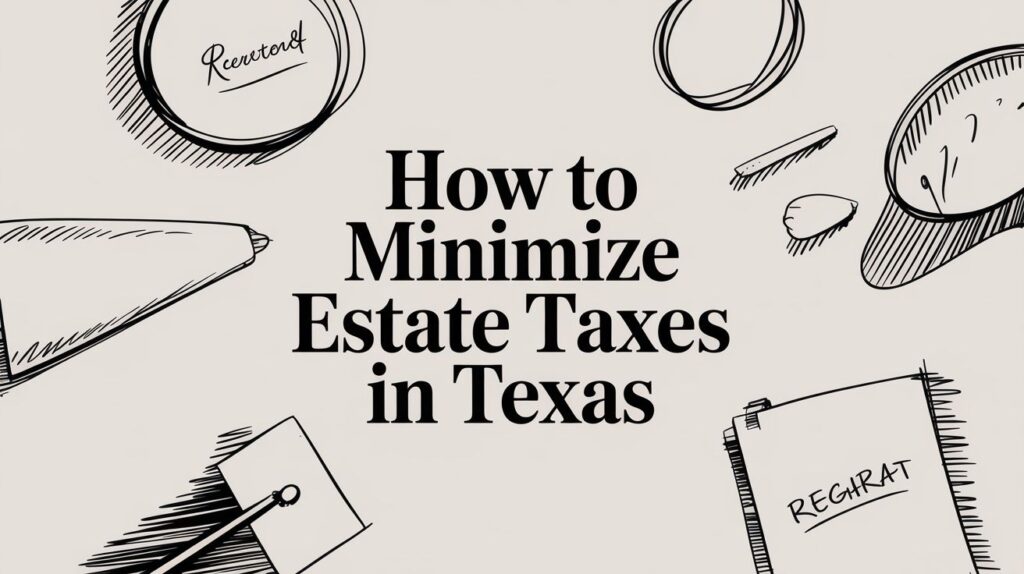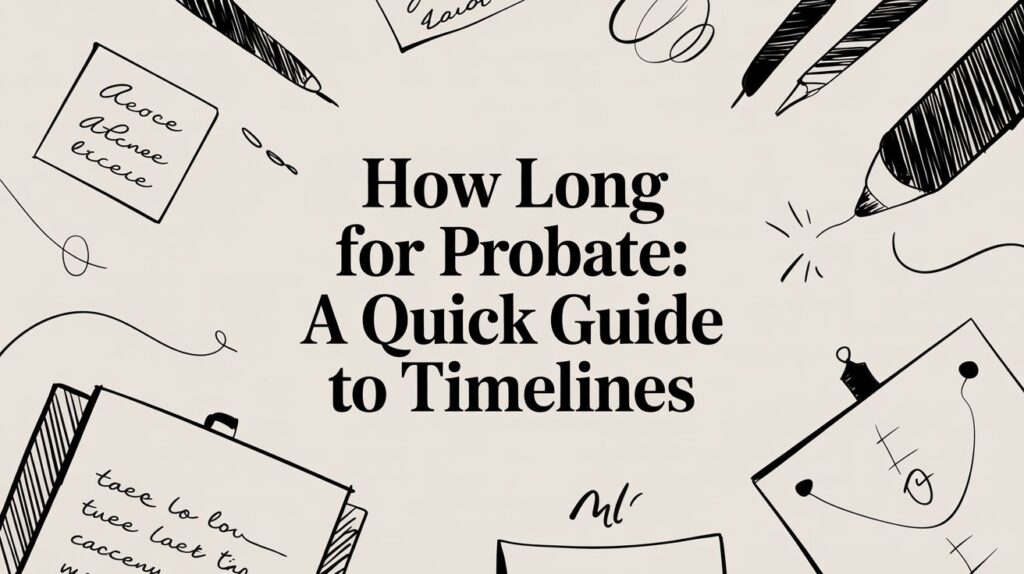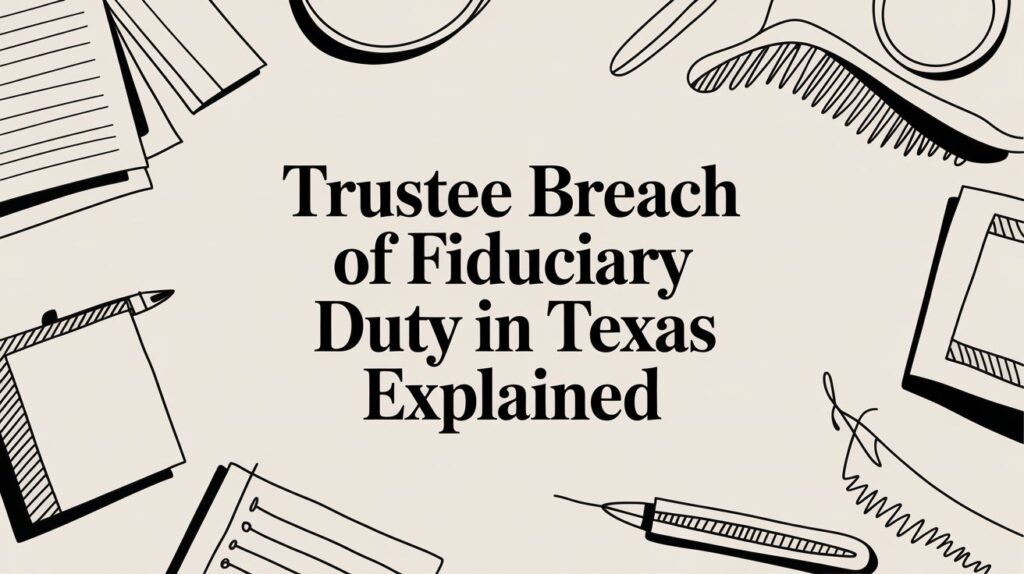Planning for your family's future brings up complex questions, and one of the most significant is how to minimize estate taxes. Securing your legacy isn't about finding a secret loophole; it's about smart, strategic planning that uses federal tax laws to keep as much of your hard-earned wealth with your heirs, where it belongs. Managing these details can feel overwhelming, but with the right legal guidance, it doesn’t have to be.
By understanding the tools available to you, like federal exemptions and trusts, you can build a confident plan that protects your family and your assets for generations to come.
Understanding Your Texas Estate Tax Exposure

Let's start with some reassuring news for Texans. Navigating the world of estate taxes can feel like a maze, but Texas law provides a clear advantage. Texas is one of the states that does not have its own state-level estate or inheritance tax. This means your estate will not face an additional tax bill from the state when you pass away.
However, this doesn't mean Texans are completely in the clear. Every U.S. citizen is still subject to the federal estate tax if their estate's value exceeds a specific threshold. This is where proactive guidance from a Texas estate planning attorney becomes absolutely critical, especially for families with significant assets who need tailored advice on matters like asset protection.
The Federal Lifetime Gift and Estate Tax Exemption
At the heart of federal estate tax planning is the lifetime gift and estate tax exemption. You can think of this as a credit from the government that allows every individual to transfer a certain amount of wealth—either during their lifetime or after death—without triggering federal taxes.
This exemption is the most powerful tool in your planning arsenal. The amount is currently at a historic high, presenting a golden opportunity for families to reduce future tax liabilities through strategic gifting and trust planning. For example, you could make substantial gifts to your children, transfer assets into protective trusts, or establish a family foundation.
The key is to act decisively. This generous exemption is scheduled to be cut roughly in half in 2026 unless Congress intervenes.
The federal exemption is the single most powerful tool for tax-efficient wealth transfer. Understanding how it works is the first step toward building a plan that protects your legacy.
Key Concepts for Texas Families
To build an effective plan, it's important to understand a few core concepts that directly shape your financial future. These ideas work together to determine your potential tax liability.
- Taxable Estate: This includes nearly everything you own or have an interest in at the time of your death, such as real estate, investments, business interests, and even life insurance proceeds.
- Annual Gift Tax Exclusion: Separate from the lifetime exemption, this allows you to give up to a certain amount—$18,000 in 2024—to as many individuals as you wish each year without using your lifetime exemption.
- Marital Deduction: This powerful rule permits unlimited, tax-free transfers of assets to a surviving spouse who is a U.S. citizen.
Simply knowing the terms isn't enough; structuring your estate requires a coordinated strategy. An AI-powered tax document analyzer can be a useful tool for gaining a clear picture of your current financial standing. Although Texas law is favorable, a lack of federal planning can lead to unwelcome surprises.
To help you get a handle on these foundational elements, we've put together a quick reference table.
Key Federal Estate Tax Concepts at a Glance
This table breaks down the fundamental terms and current figures essential for federal estate tax planning in Texas.
| Concept | Explanation | Current Relevance for Texans |
|---|---|---|
| Federal Estate Tax Exemption | The total value of assets an individual can transfer during their lifetime or at death without incurring federal estate tax. | The most significant planning tool; currently at a historic high but set to decrease in 2026. |
| Annual Gift Tax Exclusion | The amount you can gift to any individual per year without filing a gift tax return or using your lifetime exemption ($18,000 for 2024). | A powerful strategy for reducing the size of your taxable estate over time through consistent, smaller gifts. |
| Marital Deduction | Allows for unlimited, tax-free transfers of assets to a U.S. citizen spouse. | A cornerstone of planning for married couples, allowing them to defer estate taxes until the second spouse passes away. |
| Portability | Allows a surviving spouse to use any of their deceased spouse's unused lifetime exemption. | A flexible option that can effectively double the exemption amount for a married couple, but it requires a timely election. |
Grasping these concepts is the first step toward creating a robust estate plan that reflects your wishes and protects your family's financial future from an unnecessary tax burden.
Strategic Gifting to Shrink Your Taxable Estate
When considering how to minimize estate taxes, one of the most straightforward and effective strategies is smart gifting. Think of it as a way to methodically reduce the size of your taxable estate over time, ensuring more of your hard-earned wealth goes to your loved ones. It also offers a powerful opportunity to see your family benefit from your generosity during your lifetime.
This isn't just about handing out cash spontaneously. It’s about making intentional, tax-savvy transfers that align with your family’s needs and your long-term financial goals. By leveraging specific allowances in the federal tax code, you can significantly reduce your future estate tax liability.
Make the Most of the Annual Gift Tax Exclusion
The simplest place to begin is with the annual gift tax exclusion. For 2024, the law allows you to give up to $18,000 to as many people as you want, every single year, without any tax consequences. You don’t have to file a gift tax return, and these gifts do not count against your lifetime exemption. If you're married, you and your spouse can combine your exclusions to give $36,000 per person each year.
The true power of this strategy lies in consistency. Let's look at a real-world Texas scenario. Imagine a couple in The Woodlands wants to support their two children and four grandchildren.
- Annual Gift Per Recipient (from the couple): $36,000
- Total Number of Recipients: 6 (two children and four grandchildren)
- Total Gifting Power Per Year: $36,000 x 6 = $216,000
By making this an annual practice, they can transfer a significant amount of wealth out of their taxable estate. In just five years, that’s over $1 million moved completely tax-free. That's money that can help with college tuition or a down payment on a first home, all while reducing their own future tax liability.
Gifts That Don't Count Against Your Limits
Beyond the annual exclusion, federal law provides for specific types of gifts that are completely unlimited. They don’t count against your annual or lifetime exemptions, making them one of the most impactful gifting techniques available.
You can make direct payments for someone else's medical or educational expenses. The critical detail is that the payment must go directly to the institution—the hospital, doctor's office, or university. You cannot give the money to the individual you are helping.
For example, a grandparent in Houston could pay their grandchild's $50,000 university tuition bill by sending a check directly to the bursar's office. This entire gift is outside the gift tax system. It doesn’t use a dime of their annual exclusion or lifetime exemption, making it an incredibly efficient way to provide support and trim their estate.
Why You Absolutely Must Document Your Gifts
While giving is simple, proper documentation is crucial. Meticulous records are your best defense against any future questions from the IRS and are a non-negotiable part of sound estate planning.
Keeping clear, consistent records of your gifts isn't just good bookkeeping. It’s a critical step in proving your intent and ensuring your estate plan holds up under both federal rules and the Texas Estates Code.
For every significant gift, you need a paper trail that includes:
- The exact amount and date of the gift.
- The full name of the recipient.
- A copy of the cashed check or a wire transfer confirmation.
- For non-cash gifts (like stocks or real estate), a professional appraisal is needed to establish the fair market value on the date of the gift.
This paperwork serves as proof that the transfer was a genuine gift. A Texas estate planning attorney can provide step-by-step guidance on the specific records you need to keep your gifting strategy airtight and tax-efficient.
Using Trusts for Tax Efficiency and Asset Protection
If strategic gifting is a sharp tool for reducing your taxable estate, then trusts are the heavy machinery. They are the workhorses of sophisticated estate planning, offering an incredible degree of control that extends far beyond minimizing taxes. A well-crafted trust protects your assets and allows you to direct how they are used for generations.
In Texas, trusts are governed by the Texas Trust Code, which establishes the rules for their creation, management, and dissolution. For families looking to make a serious impact on their tax liability, understanding different trust structures is essential. These legal instruments can remove assets—and all their future appreciation—from your taxable estate.
This visual decision tree can help you understand where the process starts, clarifying when a gift might use the annual exclusion versus the lifetime exemption—a key first step before funding these powerful trusts.
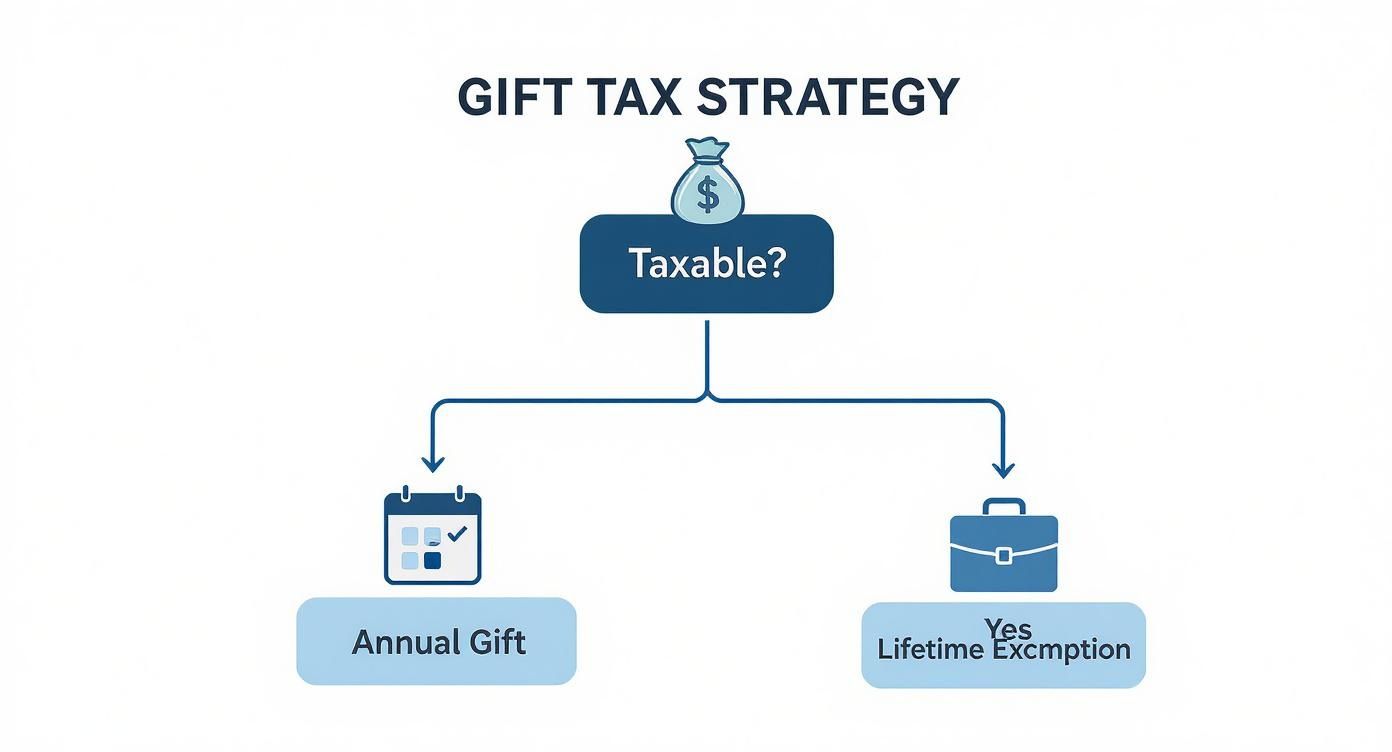
As the infographic shows, the first question in any gifting strategy is how the IRS will treat it, which guides whether you are making a simple gift or funding a more complex trust.
The Power of Irrevocable Trusts
When it comes to tax efficiency, the magic often lies within an irrevocable trust. The concept is straightforward: once you transfer assets into this type of trust, you relinquish control and ownership. While that may sound daunting, it is a critical feature. By doing so, those assets are no longer legally yours and, therefore, are no longer part of your estate for tax purposes.
One of the most effective tools is the Irrevocable Life Insurance Trust (ILIT). A large life insurance payout can easily push an estate over the federal exemption threshold, triggering a significant tax bill. However, by placing the policy inside an ILIT, the death benefit is paid directly to the trust. The trust can then distribute those funds to your family without adding a single dollar to your taxable estate. This one move can save a family hundreds of thousands—or even millions—in estate taxes. You can learn more about the significant tax benefits of irrevocable trusts in our detailed guide.
Advanced Trusts for Appreciating Assets
For assets likely to grow significantly in value, such as a business or prime real estate, more specialized trusts come into play. Two of the most common are Grantor Retained Annuity Trusts (GRATs) and Qualified Personal Residence Trusts (QPRTs).
- Grantor Retained Annuity Trust (GRAT): You place an appreciating asset into the trust and receive a fixed annuity payment for a set number of years. At the end of the term, any appreciation passes to your beneficiaries free of estate and gift tax. It's an excellent strategy for transferring wealth from high-growth assets.
- Qualified Personal Residence Trust (QPRT): This allows you to transfer your primary home or a vacation house into a trust for your children while retaining the right to live in it for a specified period. The gift's value is calculated at a significant discount, allowing you to pass on valuable real estate with a minimal tax impact.
In Texas, the trustee of any trust operates under strict fiduciary duties in Texas. This isn't just a suggestion; it's a legal obligation. They must act in the absolute best interests of the beneficiaries, a responsibility that demands diligence, loyalty, and prudence.
Don't Forget the Evolving Tax Landscape
It's also critical to remember that estate tax laws are not static. The Tax Cuts and Jobs Act (TCJA) of 2017 nearly doubled the lifetime gift and estate tax exemption, which sits at an inflation-adjusted $13.61 million in 2024. This created a golden window for wealthy families to transfer assets.
But here’s the catch: this high exemption is scheduled to sunset at the end of 2025. When it does, it will likely drop back to pre-TCJA levels of around $6-7 million. This impending change makes proactive planning with a Texas estate planning attorney more urgent than ever.
Choosing and funding the right trust requires a deep dive into your assets, your family's goals, and the intricate rules of both federal tax law and the Texas Trust Code. An experienced attorney doesn't just draft documents; they help you select the right structure for maximum tax efficiency and lasting asset protection.
Advanced Charitable Planning Strategies
For many Texans, a legacy is about more than just passing down wealth—it's about making a lasting impact on the causes you believe in. Philanthropy and smart tax planning are not mutually exclusive. In fact, they can be powerful partners, allowing you to support cherished organizations while dramatically reducing your future estate tax bill.
https://www.youtube.com/embed/-QldiqVoRu0
These strategies bring your personal values and financial goals into alignment, creating a true win-win scenario. By structuring your giving with purpose, you can create an impact that benefits both your family and the community for years to come.
Using Charitable Trusts to Create an Income Stream
Two of the most popular tools for this purpose are the Charitable Remainder Trust (CRT) and the Charitable Lead Trust (CLT). They sound similar but operate in opposite ways to achieve different, yet equally valuable, outcomes.
A Charitable Remainder Trust (CRT) is an excellent fit if you want to support a charity while also securing a dependable income stream for yourself or your family. Here’s how it works: you transfer assets into the trust, receive an immediate charitable income tax deduction, and the trust pays you an income for a set period. When that term ends, the remainder goes to your chosen charity. The best part? Those assets are now completely removed from your taxable estate.
A Charitable Lead Trust (CLT), on the other hand, flips that model. You fund the trust, and it immediately begins making payments to a charity for a specified term. When the term ends, the remaining assets pass to your heirs, often with a much lower gift or estate tax impact. It’s an incredible way to pass wealth to the next generation while making a significant charitable impact today.
Under the Texas Trust Code, a trustee of any charitable trust has a strict fiduciary duty to manage the assets responsibly. They must balance the needs of the income beneficiaries with the final charitable goal, ensuring your philanthropic vision is carried out exactly as you planned.
For a more detailed look at these structures, check out our guide on tax-efficient charitable giving in estate planning.
To help you see the differences more clearly, here's a quick comparison of these two powerhouse tools.
Comparing Charitable Planning Tools
This table breaks down two common charitable trusts to help you decide which might better fit your financial and philanthropic goals.
| Feature | Charitable Remainder Trust (CRT) | Charitable Lead Trust (CLT) |
|---|---|---|
| Primary Goal | Provides income to you/beneficiaries first, then charity gets the remainder. | Provides income to charity first, then heirs get the remainder. |
| Income Stream | Pays income to the donor or their chosen beneficiaries for a set term. | Pays income to a designated charity for a set term. |
| Tax Benefit | Immediate charitable income tax deduction for the present value of the gift. | Can significantly reduce gift and estate taxes on assets passed to heirs. |
| Best For… | Individuals seeking to supplement retirement income and make a future gift. | Individuals wanting to transfer wealth to heirs while making a current charitable impact. |
Ultimately, choosing between a CRT and a CLT depends on your primary objective. Are you looking for income now, or are you more focused on passing assets to your children in the most tax-efficient way possible?
Strategic Tools for Business Owners and Investors
Beyond trusts, business owners and investors have other powerful options. The Family Limited Partnership (FLP) is an especially effective strategy for transferring wealth, maintaining control, and securing significant tax savings.
Imagine a Dallas-based business owner who wants to begin passing her company to her children. She could establish an FLP and transfer the business assets into it. By retaining the general partner shares, she keeps control over day-to-day decisions. She can then begin gifting the limited partner shares to her children over time.
Because these limited shares lack control and marketability, they can often be valued at a discount for gift tax purposes. This allows her to transfer more of the company's real value to her heirs without using as much of her lifetime gift tax exemption. An FLP is a sophisticated tool that requires a Texas estate planning attorney to structure it correctly, ensuring it complies with both state law and IRS scrutiny.
Building Your Custom Estate Tax Plan

Knowing the tools available for estate planning—from strategic gifting to complex trusts—is an excellent start. However, the real success comes from building a plan that is uniquely yours. Securing your legacy isn't about choosing a strategy off a shelf; it's about using these tools as building blocks for a customized plan.
A cookie-cutter approach to estate tax planning is not just ineffective; it can be dangerous. Your financial situation, family dynamics, and goals are unlike anyone else's, and your plan must reflect that down to the last detail.
Why Professional Guidance is Non-Negotiable
Navigating the intersection of the Texas Estates Code and federal tax law on your own is a significant risk. A simple mistake—such as failing to properly fund a trust or document a gift—can undermine the entire plan. This is why partnering with a knowledgeable Texas estate planning attorney is not a luxury, but a necessity.
A seasoned lawyer does more than just fill out forms. They act as your personal strategist, performing a comprehensive review of your financial picture to architect a tax-efficient plan that works.
This step-by-step guidance includes:
- Analyzing your assets, from real estate and investments to business interests, to determine the best strategies for each.
- Understanding your family dynamics to ensure the plan provides for your loved ones exactly as you intend.
- Aligning your legacy goals, whether that means supporting a charity, ensuring a smooth business succession, or establishing multi-generational wealth.
This is about much more than avoiding taxes. It's about ensuring your hard-earned wealth provides lasting security for the people and causes you care about most. For those who want to dig even deeper, you can explore additional estate tax planning strategies that cover a broader spectrum of wealth management.
Combining Strategies for Maximum Impact
The most robust estate plans rarely rely on a single tool. Instead, they layer different strategies to create a powerful, combined effect that maximizes tax savings and delivers strong asset protection.
Let's consider a real-world Texas example. A Houston business owner has a thriving company and a portfolio of commercial real estate. Her custom plan might look like this:
- Annual Gifting: She and her husband use their combined annual exclusion to gift non-voting stock in their business to their children, transferring ownership over time without using their lifetime exemption.
- Irrevocable Life Insurance Trust (ILIT): They place a large life insurance policy, intended to cover potential estate taxes, inside an ILIT. This removes the entire multi-million dollar payout from their taxable estate.
- Charitable Remainder Trust (CRT): She transfers a highly appreciated commercial building into a CRT, creating an income stream for retirement, benefiting her favorite Houston charity, and removing the property's value from her estate.
A custom estate plan is a living document. It's designed to be flexible, adapting to changes in your life, your family, and the law itself to ensure your legacy remains protected.
This multi-pronged approach addresses her business succession, philanthropy, and tax planning simultaneously. Each component is carefully chosen and structured to comply with federal tax law and the fiduciary principles outlined in the Texas Trust Code. It is this level of personalized, detailed work that delivers true peace of mind.
Common Questions About Texas Estate Tax Planning
Diving into estate planning naturally brings up important questions. Getting clear, confident answers is the first step toward building a plan that allows you to feel secure about the future. Here are some of the most common questions we hear from Texas families.
Does Texas Have an Estate or Inheritance Tax?
No. Texas is one of the states that does not have its own state-level estate tax or inheritance tax. This provides a significant advantage for Texas residents.
However, it's important to remember that all Texans are still subject to the federal estate tax if their estate's total value exceeds the federal exemption limit. This is why strategic planning around federal law remains essential for high-net-worth families in our state.
How Often Should I Review My Estate Tax Plan?
Think of your estate plan as a living document. A good rule of thumb is to review it thoroughly every 3-5 years. You should also revisit it after any major life event, as these moments can significantly alter your financial landscape and personal wishes.
Major life events include:
- Marriage or divorce
- The birth of a child or grandchild
- The death of a spouse, beneficiary, or named executor
- A significant financial change, like selling a business or receiving an inheritance
- Changes in federal tax laws, such as the potential decrease in the current high exemption amount set for 2026
Regular check-ins with your Texas estate planning attorney ensure your plan remains effective, compliant, and aligned with your goals.
Can a Trust Help Me Avoid Probate and Lower Estate Taxes?
Absolutely. This powerful combination is why trusts are a cornerstone of solid estate planning.
First, any assets placed inside a Revocable Living Trust will bypass the probate process. This saves your family from a public, often slow, and expensive court proceeding. While a revocable trust alone does not reduce your taxable estate, it can be drafted with critical tax-planning provisions.
To directly reduce your tax liability, Irrevocable Trusts are the primary tool. They are designed to permanently move assets—and their future growth—out of your taxable estate. A well-designed plan often uses a combination of different trusts to achieve both goals seamlessly.
Many people believe a will keeps you out of probate court. In fact, a will is your set of instructions for the probate court. Only a properly funded trust can keep your affairs private and out of that system.
What is Portability and How Does It Help Married Couples?
Portability is a federal rule that allows a surviving spouse to use any of their deceased spouse's unused lifetime estate tax exemption. In simple terms, it can effectively double the amount a couple can pass on to their heirs tax-free.
For example, if a husband passes away and his estate uses only $4 million of his $13.61 million federal exemption, his widow can "port" over the unused $9.61 million and add it to her own exemption.
However, there is a critical requirement. To secure this benefit, the executor of the deceased spouse's estate must file a federal estate tax return (Form 706) to officially elect portability. This must be done even if no tax is due. Missing this step means the unused exemption is lost forever, which underscores why having an experienced legal team is so important.
If you’re managing a trust or planning your estate, contact The Law Office of Bryan Fagan, PLLC for a free consultation. Our attorneys provide trusted, Texas-based guidance for every step of the process.
https://texastrustadministration.com

